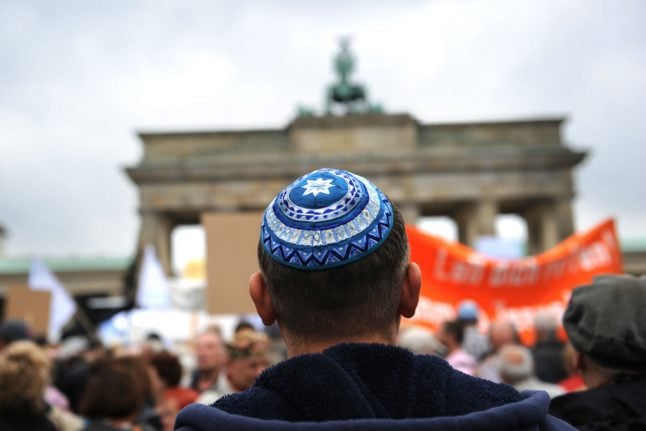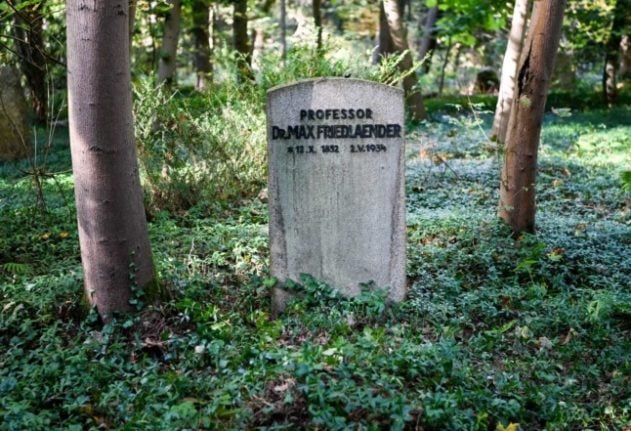Shaken by the abuse, the 37-year-old Israeli posted a video of the December 2017 incident, filmed by his friend, on social media.
The video went viral and unleashed a torrent of anti-Semitic hate mail.
“There are people who are obsessed by me,” said Feinberg with a wry smile, as he pointed to the latest abuse that has appeared on his social media account — more than 65 pages of insults sent by a certain Lutz F.
The insults have become such regular occurrences that Feinberg already knows what to expect.
“He starts by denying the Holocaust, then continues with a hate tirade against Israel, then uses Nazi-era insults” such as “dirty Jew”, “shit Jew”, recounted Feinberg.
Then there are also blood-curdling death threats, said Feinberg, reading one typed in uppercase: “I'm going to cut your throat”.
His restaurant offering Middle-Eastern specialities, a stone's throw from the west Berlin shopping thoroughfare Kurfürstendamm, was opened six years ago.

Berlin's bustling Kurfürstendamm in December. Photo: DPA
Hummus, falafel and other Kosher dishes are on the menu in the cosy setting with brightly decorated walls where the Star of David also features.
At the window stands the menorah — the seven-lamp candelabrum which is one of the oldest symbols of the Jewish faith
Firecrackers, online hate
The abuse began as stickers calling for a boycott of Israel, followed by telephoned or emailed insults.
The abuse took on a new dimension after the December 2017 video went online.
In the video, a white man aged around 50 is seen hurling insults in German at the restaurateur.
“You've no business here,” said the man, “go back to your gas chambers.”
“The video went viral and I gave interviews,” said Feinberg, adding that he himself became more militant as the insults got more extreme.
Today, the harassment comes at least once a week. “They are very creative,” he said.
Beyond posting nasty messages on social media, his opponents leave poor reviews of his restaurant online.
Others have turned up in person at his restaurant to harass his staff.
“There was a more serious case when three teenagers threw large firecrackers towards clients, sparking panic” before fleeing, he recalled.
Most of his attackers are Muslims, he said, noting that they are often newly arrived migrants as more than a million asylum seekers, mostly from the Arab world, came to Germany between 2015 and 2016.
Others stemmed from Germany's two political extremes — left and right.
Won't give up
Feinberg said he has filed 20 complaints with the police to date.
But so far only the attacker filmed on video has been sentenced to a suspended jail term of seven months.
Another suspect will soon face the court.

A sign in Berlin reading 'Against all anti-Semitism'. Photo: DPA
Nothing has come of the other cases, an outcome that he calls “surprising”.
In the case of Lutz F., “the justice system could not do anything because he is deemed incompetent before the courts,” said Feinberg.
In many other cases, the attacker is faceless and nameless.
But the abusers are getting bolder, said Feinberg, with more people posting their virulent comments using their real identities.
SEE ALSO: Germany steps up fight against anti-Semitism with new reporting centre
“It's absurd, many people don't even fear any consequences,” he said,
adding that he felt let down by the authorities.
Faced with a rash of anti-Semitic crimes, Berlin at the end of 2018 named a prosecutor dedicated to investigating such violations.
“For the moment, it hasn't had any impact,” said Feinberg.
In a recent interview, the prosecutor Claudia Vanoni admitted that out of 440 cases of anti-Semitism filed last year, 41 percent were shelved with no outcome due to a lack of evidence.
Despite the seemingly unending battle against his abusers, Feinberg is determined to carry on.
“I don't want to give up now,” he said.
Rather, he is fighting back through a petition urging authorities to toughen up rules against anti-Semitism, which has already garnered 50,000 signatures.
“Personally I'm getting more support and love than hate and aggression,” he said.
“I hope this positive side will get stronger and louder in Germany, France
and Europe.”



 Please whitelist us to continue reading.
Please whitelist us to continue reading.
Member comments